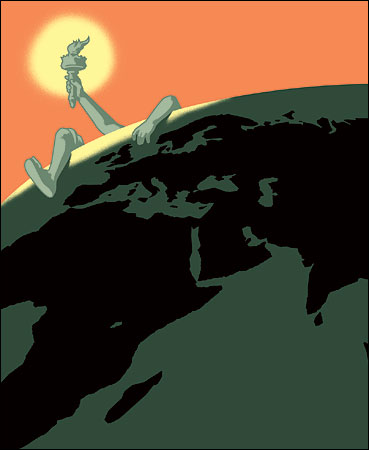|
July 2, 2005
Christopher Niemann's image is about the American democratic light lightening up a non democratic world:
 According to Thomas Jefferson the American form of republican self-government would become every nation's birthright. According to Thomas Jefferson the American form of republican self-government would become every nation's birthright.
That is the core of Americans mean when they talk about the manifest destiny of the US.
Jefferson went on to say that democracy's worldwide triumph was assured because "the unbounded exercise of reason and freedom of opinion" would soon convince all men that they were born not to be ruled but to rule themselves in freedom.
It is US nationalism universalized to the world spirit. President Bush expresses this in terms of freedom as God's plan for mankind.
So what happens when the world spirit of reason and democracy becomes connected to empire, hegemony, power politics and national interest in a world of nation-states?
It is addressed by Michael Ignatieff in the New York Times Magazine. You can find some comments over at Williams Burrough's Baboon by Glenn Condell here and wbb here. For more commentary see Technorati
Ignatieff says that:
'In the cold war, most presidents opted for stability at the price of liberty when they had to choose. This president, [ie. President Bush] as his second Inaugural Address made clear, has soldered stability and liberty together: "America's vital interests and our deepest beliefs are now one." As he has said, "Sixty years of Western nations excusing and accommodating the lack of freedom in the Middle East did nothing to make us safe---because in the long run stability cannot be purchased at the expense of liberty."'
Ignatieff says that it is terrorism that has joined together the freedom of strangers and the national interest of the United States. On this account democracy in the Middle East will actually make America safer.
To his credit Ignatieff defends this position by addressing the issue of empire. He says that the charge that promoting democracy is imperialism by another name is baffling to many Americans. How can it be imperialist to help people throw off the shackles of tyranny? The short and long answer is by overthrowing other peoples' governments and by invading and occupying other countries.
Ignatieff responds to this as follows:
'The problem here is that while no one wants imperialism to win, no one in his right mind can want liberty to fail either. If the American project of encouraging freedom fails, there may be no one else available with the resourcefulness and energy, even the self-deception, necessary for the task. Very few countries can achieve and maintain freedom without outside help. Big imperial allies are often necessary to the establishment of liberty. As the Harvard ethicist Arthur Applbaum likes to put it, "All foundings are forced." Just remember how much America itself needed the assistance of France to free itself of the British. Who else is available to sponsor liberty in the Middle East but America?'
He says that it is not imperialistic to believe believe that most human beings, if given the chance, would like to rule themselves.
No it is not. It is imperialistic to invade and occupy a foreign country that does not threaten your national interest and then to invent fictions about the threats posed.
Ignatieff acknowledges that many foreigners do not happen to buy into the American version of promoting democracy and that many American liberals don't share the vision either.
|

1st Most humans want to be ruled. When free will is given to the mass, they will most certainly do the "wrong" thing.
2nd The US is not a democracy.